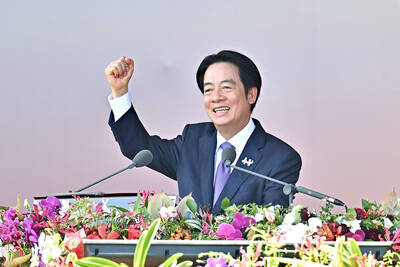In two months, President Chen Shui-bian (
The appointments, carried out unnoticed in the past, are bound to draw close scrutiny this time, as some are urging Chen to drop senior presidential advisor Shi Wen-long (許文龍) and Tokyo-based national policy advisor Alice King (金美齡), while others are pressing for their retention.
It seems odd that the issue should become a political battlefield, in light of the petty influence the occupants of the positions can exert over the nation's politics.
Created by the late former president Chiang Kai-shek (蔣介石) in 1948, both offices have traditionally been filled by senior retired officials to keep their prestige aglow -- if only nominally.
Prominent among them are former vice president Hsieh Tung-ming (
Leading industrialists such as Nita Ing (
"The roster grew so long at one point that the legislature passed a measure in 1996 that restricts the number of senior presidential advisors and national policy advisors to 30 and 90 respectively," said KMT lawmaker Liu Kuang-hua (
To do away with what he tagged as part of the spoils system, the three-term legislator is proposing a drastic cut on both institutions.
"A quarter of the current size should suffice," he argues.
Although seldom consulted, those advisors enjoy a generous salary.
A senior presidential advisor is paid NT$201,960 per month, equivalent to a vice premier, and a national policy advisor is paid NT$179,520, equivalent to a Cabinet minister, according to the Presidential Office.
To save the state coffers unnecessary expenditure, the 1996 amendment also stipulates that only 45 of those advisors may draw a paycheck, with the rest serving unpaid.
King and Shi, active donors to the ruling DPP, belong to the latter group.
Shi enraged pro-China lawmakers for telling a Japanese cartoonist that some Taiwanese comfort women volunteered to serve as prostitutes for the Japanese army during World War II.
King, an overseas independence advocate, openly proclaimed that the ROC was "extinct" during her two trips to Taipei earlier this month.
"Only a handful of advisors keep an office inside the Presidential Office," a personnel official said, adding that the situation was the same when the KMT was in power.
Hsu, the DPP chair who later quit the party to contend the 2000 presidency as an independent, has only met with Chen two or three times in the last 10 months, Hsu's aide said.
There are no regular meetings between the president and the advisors, who are not allowed to partake in policy making in the first place, an aide to senior presidential advisor Ying Chung-wen (
In early 1999 after his failed bid to win reelection as Taipei mayor, Chen himself turned down former president Lee Teng-hui's (
"Now as president, Chen has the opportunity to rid the government of an obsolete design, in line with his pledge to make his administration smaller and more efficient," Liu, the KMT lawmaker, said.

The Ministry of the Interior (MOI) is to tighten rules for candidates running for public office, requiring them to declare that they do not hold a Chinese household registration or passport, and that they possess no other foreign citizenship. The requirement was set out in a draft amendment to the Enforcement Rules of the Public Officials Election and Recall Act (公職人員選舉罷免法 ) released by the ministry on Thursday. Under the proposal, candidates would need to make the declaration when submitting their registration forms, which would be published in the official election bulletin. The move follows the removal of several elected officials who were

FOUR DESIGNATED AREAS: Notices were issued for live-fire exercises in waters south and northwest of Penghu, northeast of Keelung and west of Kaohsiung, they said The military is planning three major annual exercises across the army, navy and air force this month, with the navy’s “Hai Chiang” (海強, “Sea Strong”) drills running from today through Thursday, the Ministry of National Defense said yesterday. The Hai Chiang exercise, which is to take place in waters surrounding Taiwan, would feature P-3C Orion maritime patrol aircraft and S-70C anti-submarine helicopters, the ministry said, adding that the drills aim to bolster the nation’s offshore defensive capabilities. China has intensified military and psychological pressure against Taiwan, repeatedly sending warplanes and vessels into areas near the nation’s air defense identification zone and across

SENATE RECOMMENDATION: The National Defense Authorization Act encourages the US secretary of defense to invite Taiwan’s navy to participate in the exercises in Hawaii The US Senate on Thursday last week passed the National Defense Authorization Act (NDAA) for Fiscal Year 2026, which strongly encourages the US secretary of defense to invite Taiwan’s naval forces to participate in the Rim of the Pacific (RIMPAC) exercise, as well as allocating military aid of US$1 billion for Taiwan. The bill, which authorizes appropriations for the military activities of the US Department of Defense, military construction and other purposes, passed with 77 votes in support and 20 against. While the NDAA authorizes about US$925 billion of defense spending, the Central News Agency yesterday reported that an aide of US

NATIONAL DAY: The ‘Taiwan Dome’ would form the centerpiece of new efforts to bolster air defense and be modeled after Israel’s ‘Iron Dome,’ sources said President William Lai (賴清德) yesterday pledged to strengthen the nation’s air defense capabilities and build a “T-Dome” system to create a safety net against growing military threats from China. “We will accelerate our building of the T-Dome, establish a rigorous air defense system in Taiwan with multi-layered defense, high-level detection and effective interception, and weave a safety net for Taiwan to protect the lives and property of citizens,” he said in his National Day address. In his keynote address marking the Republic of China’s (ROC) 114th anniversary, Lai said the lessons of World War II have taught nations worldwide “to ensure that